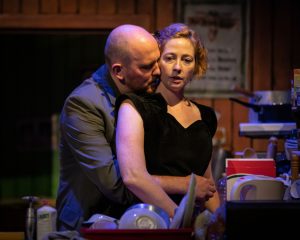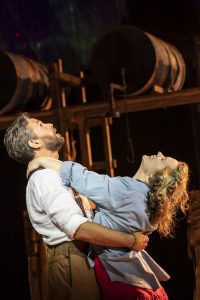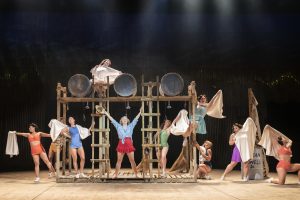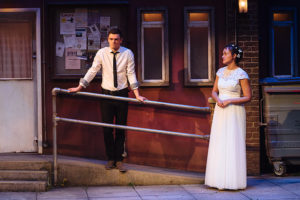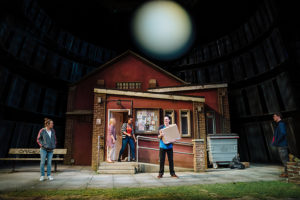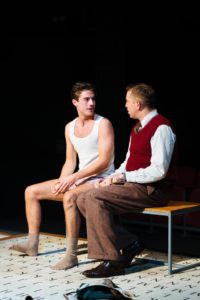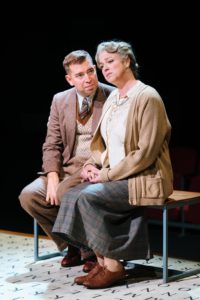An enjoyably theatrical show based on Noel Coward’s iconic romance
★★★★
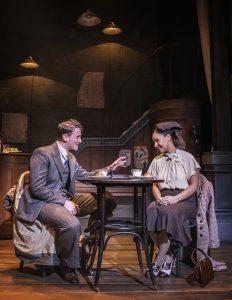
If you’re expecting to see a straightforward stage adaptation of the film Brief Encounter, you may be disappointed. If you’re expecting to see Emma Rice’s legendary multimedia production of Brief Encounter, you may be disappointed.
If you go without ever having seen the film, or at least without any expectations, you should enjoy an evening of humour, passion, poignancy and great theatricality.
Let’s take the lack of similarity to the film first. Part of the issue here is that in writing this play, Emma Rice has combined elements of Noel Coward’s screenplay with his original short play Still Life on which the film was based. A great idea but this means it isn’t pure Brief Encounter.
As to Emma Rice‘s adaptation, the original Kneehigh production from ten or so years ago,included a big screen with a movie showing that imitated the David Lean version but featured the stage actors, who then interacted with it. In this production, the screen has gone.
The story of the chance meeting of two married people in a railway station buffet and their subsequent, hesitant, guilt-ridden affair is still centre stage in this production of Brief Encounter but, there is much more about the relationship between Myrtle the café manager and Albert the station guard than you see in the film.
This is especially true in the first act where their flirtatious and at times vulgar chatting up is given almost equal weight with the more reserved and cautious romance between Alec and Laura. There is a strong and, I suggest, elitist suggestion that middle class equals repressed and serious, while working class equals liberated and comic. Indeed Kate Milner-Evans and Charles Angiama are funny as Myrtle and Stanley, and the former is a particularly strong singer.
As well as those two couples, there is a third romance going on between a more innocent younger couple Beryl the waitress and Stanley who sells food from a tray on the platform. There are nicely judged performances by Hanna Khogali and Oliver Aston. Although the ‘compare and contrast’ is very interesting, this made the first act very bitty. It was quite a challenge to get to know Alec and Laura.
Although the screen has disappeared, much of Emma Rice’s inventive adaptation remains in this production directed by Robert Kirby. Songs and dance are used to dazzling effect, with all seven actors singing and several playing instruments as well. The songs are by Noël Coward, sometimes his music and lyrics, sometimes his lyrics with music by Eamonn O’Dwyer. They are well chosen to reflect the mood of each moment. For example, Beryl sings an appropriate Mad About The Boy and, at the end, to match the poignancy of the parting, Alec (Callum McIntyre) sings A Room With A View with lines like ‘A room with a view / And you / And no one to worry us / No one to hurry us / Through this dream we found’. And beautifully sung.
There is also mime and dance. It is pure theatre, which I mean it couldn’t be done in any other medium and it is what we love about being at a live performance.
The Watermill stage is small so Harry Pizzey’s set design leaves it open and cleverly uses a few pieces of scenery to convey the locations. The café counter doubles as a piano; armchairs and tables roll smoothly on and off as the scene changes from the café to a flat to Laura’s home. Which is where we meet her husband Fred, also played by Charles Angiama. You can see why she might want someone less solid, a lot more exciting.
There may be no big screen but the production does use a nice and very amusing device to remind us of its cinematic connection, namely sound effects. As Myrtle mimes pouring tea, one of the cast in the corner pours water into a jug in front of a microphone.
The second act is much more focused on Laura and Alec, and the better for it. This is a classic love story and well told in this version. Their blossoming romance, their growing love that becomes increasingly reckless, the agonising over the rights and wrongs of their affair, the ecstasy and the heartbreak.
As Laura says at one point, their love has made her ‘a stranger in her own home’. The most interesting, because the most conflicted, character is Laura. Played by Laura Lake Abedisi, it is the more difficult role because she has to express herself from behind a mask of repressed feelings and the kind of strangulated accent that you will be familiar with from films of the 1930s and 40s, or the Queen in The Crown. Ms Abedisi does a splendid job and, by the end, I was totally in tune with her anguish.
Callum McIntyre is excellent as Alec Harvey, combining charm, confidence, humour and profound feeling.
This may not be what you would expect if you love the film, but if you accept that it has been taken apart and reconstructed as a piece of theatre, I think you will have a great evening.
Brief Encounter continues at The Watermill in Newbury until 13 November 2021
One Minute Theatre Reviews was supplied with a press ticket by the producers
Watch this review on the One Minute Theatre Reviews channel on YouTube

